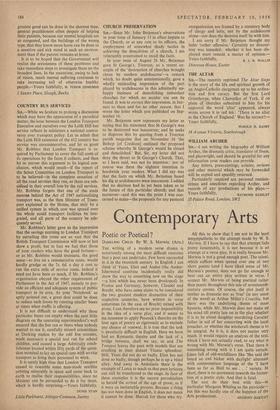Contemporary Arts
Poetic or Poetical ?
DARKLING CHILD. By W. S. Merwin. (Arts.) THE writing of a modern verse drama is notoriously among the most difficult exercises that a poet can undertake. Few have succeeded in it in the twentieth century. In English I can think of Yeats, Eliot and Auden (the Auden- Isherwood combine incidentally really did show the way to something new on the stage —a hint which has never been developed). In France and Germany, however, Claudel and Brecht, who have some claim to be considered the two greatest modern dramatists of their respective countries, have written in verse sometimes (in the case of Brecht) mixed with prose. I can therefore sec no prior impossibility in the idea of a verse play, and it seems to me nonsense to apply Peacock's theories on the four ages of poetry so rigorously as to exclude any chance of renewal. It is true that the task is peculiarly difficult in English. Here we have had no Romantic theatre and the lack of a bridge between, shall we say, us and The Tempest leaves the poet with models that are crushing in their distant Titanic splendour. Still, Yeats did not do so badly. Eliot has not done so badly, though perhaps he is up a blind alley. And away in Andalucia there is the example of Lorca to teach us that pure lyricism can still be transferred to the stage. In face of these examples it is the merest parochialism to herald the arrival of the age of prose, as if it were an ineluctable process. Because a thing has not been done in English, it does not mean it cannot be done. Hurrah for those who try. All this to show that I am not in the least unsympathetic to the attempt made by W. S. Merwin. If I have to say that that attempt fails pretty lamentably, it is not because' it is an attempt at a verse play. It is really because Mr. Merwin is not a good enough poet. The talent, which suffices when spread over one of two short poems (and I have liked some of Mr. Merwin's poems), does not go far enough to bear out an entire play written in verse. I suspect Mr. Merwin of being poetical rather than poetic throughout this tale of seventeenth- century covens. Of course, the plot itself is neither as dramatic nor as 'true' (in any sense of the word) as Arthur Miller's Crucible, but there was the underlying , theme of mass hysteria, while Mr. Merwin does not make up his mind till pretty late on in the play whether it is to be about daughter murdering Cavalier father in aid of her consorting with the local 'preacher, or whether the witchcraft theme is to be integral. As it is, it does not matter very much. It would require an analysis of the text, which I have not actually read, to say what is wrong with Mr. Merwin's verse. That there is something wrong with it I am quite certain. Lines full of old-worldliness like 'She said she heard an owl bicker with daylight' alternate with commonplace language of the 'I have been as far as Hull to see . . .' variety. In short, there is no movement towards the forma- tion of a poetic style. And that is fatal.
The cast do their best with this—in particular Margaret Whiting as the parri'cide- but this was hardly one of the happiest of the


































 Previous page
Previous page